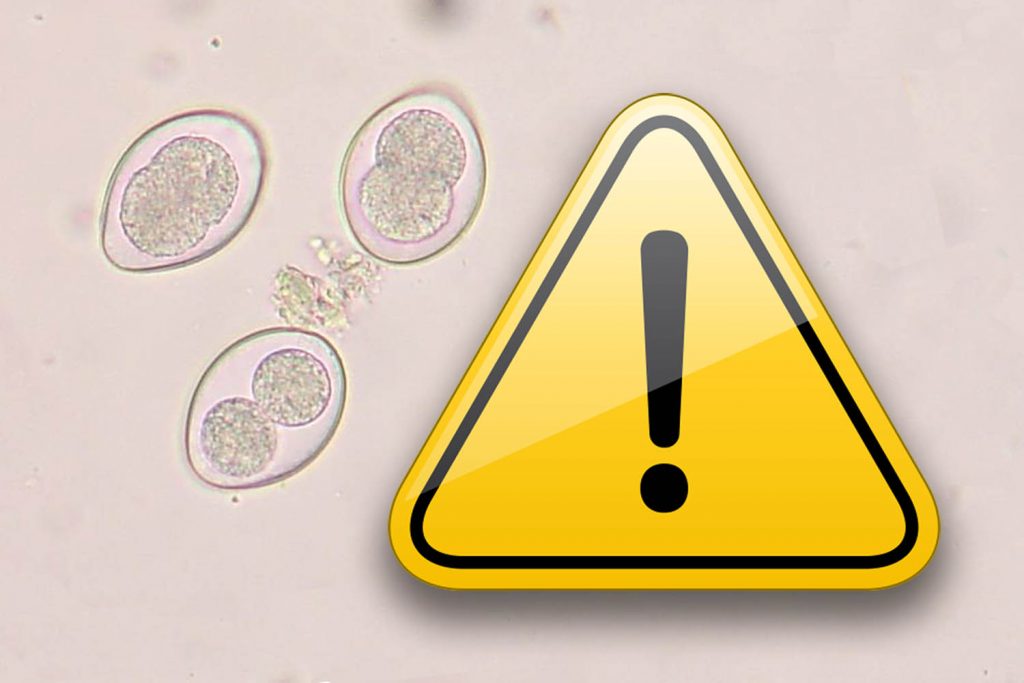07 Apr Coccidiosis is one of the most important predisposing factors to necrotic enteritis

Necrotic enteritis is the result of the overgrowth of Clostridium perfringens in the upper part of the intestines. Clostridum perfringens is a Gram-positive bacteria and forms spores that are extremely resistant to desiccation, heat, disinfectants, and UV radiation, and as a consequence, it is frequently present in poultry houses all around the world.
In conditions of optimal gut health, Clostridium perfringens is present in the lower part of the intestines without causing disease. Whenever there is damage in the gut epithelium, imbalance of the gut flora, impairment of the digestive immunity, or sudden changes in the diet, Clostridium perfringens may overgrow not only in the distal parts of intestines but also in the proximal parts, starting the disease called necrotic enteritis.
Coccidiosis is an enteric disease caused by several Eimeria species. During part of its life circle, coccidia penetrates the epithelial cells, causing tissue damage and the leakage of plasma proteins to the intestinal lumen. As a part of the defense mechanism against coccidia, the epithelium increases the secretion of mucus.
The presence of coccidia predisposes to necrotic enteritis in three ways:
- Both the plasmatic proteins and the mucus constitute a rich source of nutrients for Clostridium perfringens, which starts proliferating.
- The presence of coccidia also disrupts the balance of the gut flora by decreasing the counts of beneficial or non-pathogenic bacteria such as Lactobacillus, Faecalibacterium, and Candidatus sp., while increasing the counts of pathogenic bacteria such as Lysinibacillus, and Escherichia. The drift in the gut flora composition favors the growth of Clostridium perfringens.
- On the other hand, the penetration of Eimeria in the intestinal epithelium breaks the gut barrier, allows Clostridium perfringens to access the bloodstream and travel to the liver, where it starts an infection.
Per our experience in the field, many cases of necrotic enteritis are linked to subclinical coccidiosis. Examination of the intestinal contents and the feces under the microscope will help to diagnose the subclinical coccidiosis and is a first step towards the resolution of the disease (contact our analysis service laboratory for assistance).
Essential oils are being tested as a natural alternative to synthetic coccidiostats. Essential oils and phytogenics in general are effective to optimize gut health, helping to prevent coccidiosis and necrotic enteritis.
Other predisposing factors, such as wet litter, which is essential for the sporulation of Eimeria, and bad hygiene, must be taken into account when designing a prevention plan against necrotic enteritis.
Products of choice
GrowthPlus© is added to feed to maintain and improve digestive health. It is formulated with synergistic ingredients:
- Bactericidal and fungicidal plant extracts, combined with organic acids for better effectiveness, that reduce the number of pathogenic microbes in the digestive system.
- Plant extracts with prebiotic effect, that promote the growth of beneficial bacteria in the gut.
- Immunostimulant and antioxidant plant extracts.
- Silicates with mycotoxin binding function.
It is especially useful in cases of gizzard diseases, necrotic enteritis, feed passage and other enteritis. It is also used as a natural growth promoter and to replace antibiotic growth promoters.
PlusProtect Digestive© is intended for digestive health in birds and rabbits of all ages. It is formulated with synergistic ingredients:
- Essential oils with bactericidal and fungicidal activity
- Plant extracts with prebiotic effect.
- Immunostimulant and antioxidant essential oils
PlusProtect Digestive© is useful to improve gut health in the following cases:
- Candidiasis in beak, crop and gizzard
- Bacterial infections in gizzard. In severe cases, it is better to give together with our PlusBind© line (mycotoxin binders)
- Bacterial infections in the intestines (necrotic enteritis; E.coli; Salmonella sp.)
- General digestive imbalances, such as feed passage.

Certain health statements may not be applicable in your region.

